What is hydrogen?
Hydrogen is the first element in the periodic table and the most abundant element in the universe. As the lightest and simplest element, it consists of one proton and one electron and has a high energy. Not only is hydrogen an energy carrier, it is also prized for its versatility: it can be converted into electricity, used as a transportation fuel, and plays a role in heating, cooling, and a variety of other industrial applications.
Why do we care about hydrogen?
We believe that hydrogen will play a central role in the design of modern energy systems to achieve full green energy independence and security. Globally, an emerging industry is emerging around the potential of hydrogen as a storable fuel or energy carrier. Hydrogen has received widespread attention from industry, environmentalists and governments because of its many advantages over battery power technology. With access to a large number of renewable energy sources, green hydrogen has become a key solution to promote the development of future green energy systems.
Why combine hydrogen with intermittent renewable energy?
We are at a turning point in energy understanding. Solar and wind are the two fastest growing energy sources. While governments and industry are increasingly recognizing that fossil fuels are a thing of the past, ensuring that solar and wind energy is available when we need it remains a challenge. Variable renewables are competitive and customers increasingly demand reliable, secure and independent energy supplies from sustainable sources. On-site green hydrogen production can achieve complete green energy independence and security, which is one of the reasons why a new global industry has formed around the potential of hydrogen as a storable fuel or energy carrier.
What are the losses when hydrogen is stored?
If stored properly, there will be no loss of hydrogen. Unlike diesel, hydrogen has no expiration date and can be stored for long periods.
Why Green Hydrogen?
About 99% of the hydrogen currently used worldwide is produced through fossil fuels, most of which is through the steam methane reforming process of natural gas, which produces a large amount of greenhouse gas emissions. When hydrogen is produced from water in an electrolyzer using renewable energy, we call it green hydrogen. Hydrogen acts as a bridge between renewable power generation and other types of energy carriers, allowing us to achieve clean energy without fossil fuels not only in the power sector.








